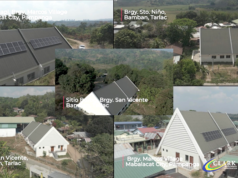CITY OF SAN FERNANDO—Some 1.3 million barangay health workers (BHWs) across the country are being eyed to render the services left by the growing legions of health professionals that now work abroad.
Akbayan Representatives Risa Hontiveros and Walden Bello plan to support them through an institutionalized, government-funded program training them to become midwives, dentists, nurses and doctors.
“Bibong BHW Education and Training Program” is what their measure, House Bill No. 6536, seeks to put in place. “Bibo” means smart.
The program provides a “simple and innovative solution” to the brain drain in the health sector, the Akbayan lawmakers said in their explanatory note to the bill filed on June 17.
About 3,000 doctors have worked as nurses abroad from 2000 to 2005 while 85,000 nurses took employment overseas from 1994 to 2003, Hontiveros and Bello said.
“The migration of health professionals has impaired the country’s health sector,” they noted.
The sector is seen to be in for more troubles. Some 3,000 doctors have enrolled in nursing schools in 2006, 200 hospitals have shut down in the last three years and 300 others have scaled down operations because of lack of personnel.
The big army of BHWs gives the country a “potent workforce.”
“With the right training, our BHWs could become midwives, dentists, nurses and doctors, filling up the gap left by medical professionals who have opted to work abroad,” they said.
What Hontiveros and Bello want to institutionalize for BHWs is an innovative step ladder training program that has been started by the University of the Philippines and which can be done in coordination with the Department of Health and local governments.
It takes to a more systematic level the educational programs given benefits under the Barangay Health Workers Benefits and Incentives Act of 1995 (Republic Act 7883), a review by Punto showed.
HB 6536 also wants to strengthen the accreditation system for BHWs and give them additional benefits like full scholarships, socialized subsidies, study-now-pay-later schemes, monthly basic pay of P4,500, mandatory PhilHealth membership and free medical services for veteran BHWs.
Under RA 7883, BHWs work as volunteers with no fixed honoraria. Depending on barangay captains or local officials, they can get a stipend of P500 or P1,000 monthly, some BHWs said in interviews. Some local governments, like the Pampanga provincial government, have been enroling them under PhilHealth.
The DOH shoulders their hospitalization for up to P10,000, according to Dr. Rio Magpantay, DOH director in Central Luzon.
In the proposed training program, the step ladder system consists of a three-month basic course on community health work; 18-month Bachelor of Science in Health where BHWs may specialize in midwifery, pharmacology, occupation therapy, dentistry or physical therapy; 15-month Bachelor of Science in Nursing; and a five-year Doctor of Medicine course.
“In between each step, the trainees shall be required to go back to their communities to work with local hospitals, rural health units, or community health centers for at least six months. BHWs may enter and exit at any level, provided that they take placement tests that shall be administeredby the Civil Service Commission.
The bill seeks an initial funding of P50 milllion that will go into DOH’s budget in support of the program. It also requires local governments to share in the cost of BHW training.
Akbayan Representatives Risa Hontiveros and Walden Bello plan to support them through an institutionalized, government-funded program training them to become midwives, dentists, nurses and doctors.
“Bibong BHW Education and Training Program” is what their measure, House Bill No. 6536, seeks to put in place. “Bibo” means smart.
The program provides a “simple and innovative solution” to the brain drain in the health sector, the Akbayan lawmakers said in their explanatory note to the bill filed on June 17.
About 3,000 doctors have worked as nurses abroad from 2000 to 2005 while 85,000 nurses took employment overseas from 1994 to 2003, Hontiveros and Bello said.
“The migration of health professionals has impaired the country’s health sector,” they noted.
The sector is seen to be in for more troubles. Some 3,000 doctors have enrolled in nursing schools in 2006, 200 hospitals have shut down in the last three years and 300 others have scaled down operations because of lack of personnel.
The big army of BHWs gives the country a “potent workforce.”
“With the right training, our BHWs could become midwives, dentists, nurses and doctors, filling up the gap left by medical professionals who have opted to work abroad,” they said.
What Hontiveros and Bello want to institutionalize for BHWs is an innovative step ladder training program that has been started by the University of the Philippines and which can be done in coordination with the Department of Health and local governments.
It takes to a more systematic level the educational programs given benefits under the Barangay Health Workers Benefits and Incentives Act of 1995 (Republic Act 7883), a review by Punto showed.
HB 6536 also wants to strengthen the accreditation system for BHWs and give them additional benefits like full scholarships, socialized subsidies, study-now-pay-later schemes, monthly basic pay of P4,500, mandatory PhilHealth membership and free medical services for veteran BHWs.
Under RA 7883, BHWs work as volunteers with no fixed honoraria. Depending on barangay captains or local officials, they can get a stipend of P500 or P1,000 monthly, some BHWs said in interviews. Some local governments, like the Pampanga provincial government, have been enroling them under PhilHealth.
The DOH shoulders their hospitalization for up to P10,000, according to Dr. Rio Magpantay, DOH director in Central Luzon.
In the proposed training program, the step ladder system consists of a three-month basic course on community health work; 18-month Bachelor of Science in Health where BHWs may specialize in midwifery, pharmacology, occupation therapy, dentistry or physical therapy; 15-month Bachelor of Science in Nursing; and a five-year Doctor of Medicine course.
“In between each step, the trainees shall be required to go back to their communities to work with local hospitals, rural health units, or community health centers for at least six months. BHWs may enter and exit at any level, provided that they take placement tests that shall be administeredby the Civil Service Commission.
The bill seeks an initial funding of P50 milllion that will go into DOH’s budget in support of the program. It also requires local governments to share in the cost of BHW training.




